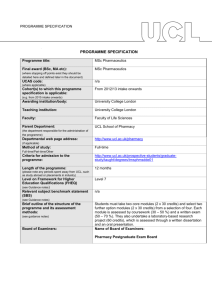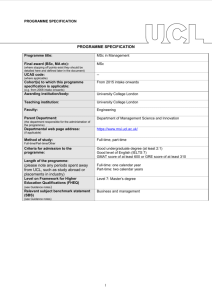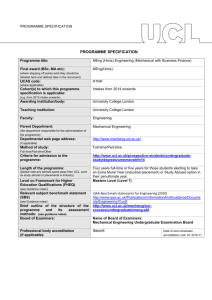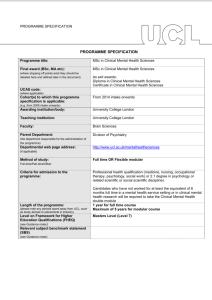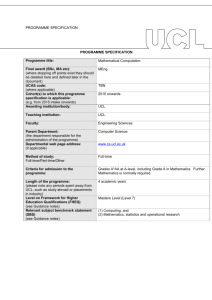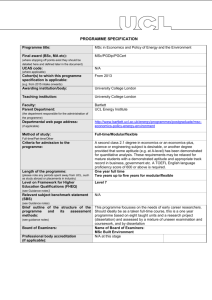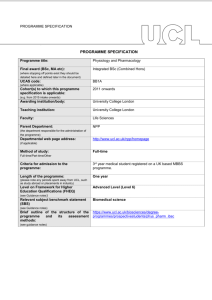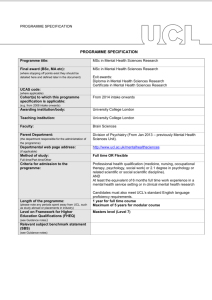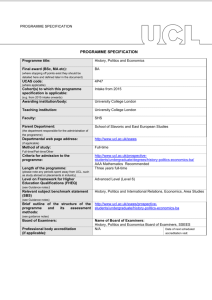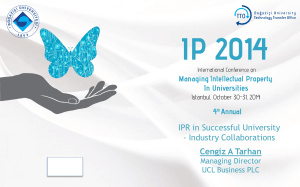MSc Pharmaceutical Formulation and
advertisement
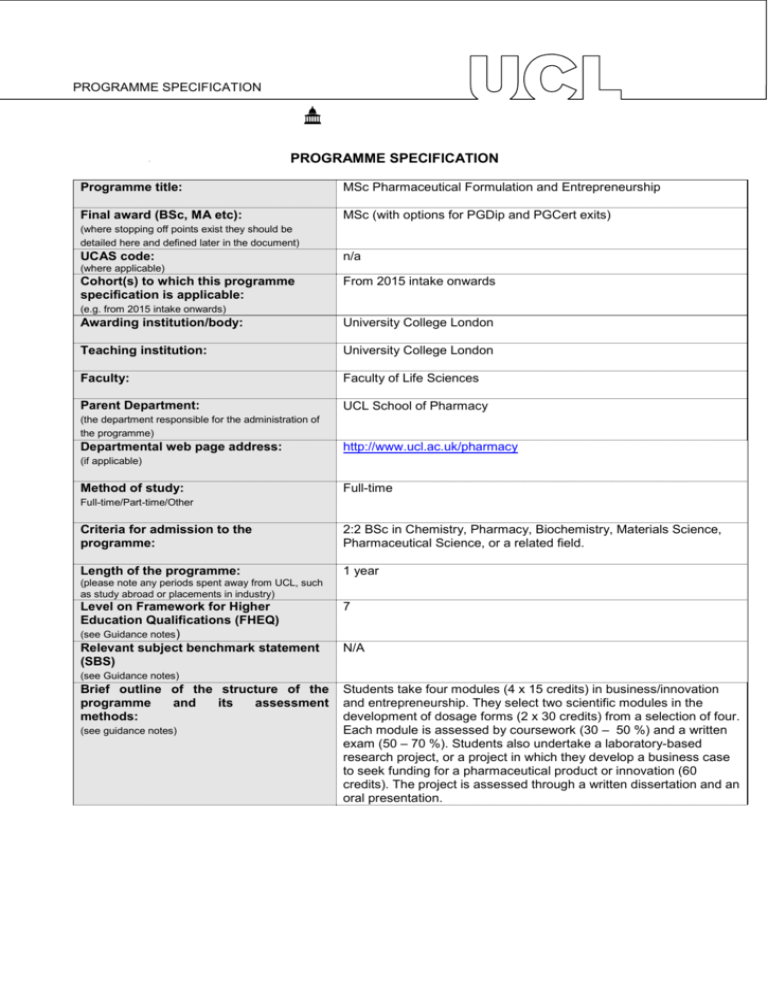
PROGRAMME SPECIFICATION PROGRAMME SPECIFICATION Programme title: MSc Pharmaceutical Formulation and Entrepreneurship Final award (BSc, MA etc): MSc (with options for PGDip and PGCert exits) (where stopping off points exist they should be detailed here and defined later in the document) UCAS code: n/a (where applicable) Cohort(s) to which this programme specification is applicable: From 2015 intake onwards (e.g. from 2015 intake onwards) Awarding institution/body: University College London Teaching institution: University College London Faculty: Faculty of Life Sciences Parent Department: UCL School of Pharmacy (the department responsible for the administration of the programme) Departmental web page address: http://www.ucl.ac.uk/pharmacy (if applicable) Method of study: Full-time Full-time/Part-time/Other Criteria for admission to the programme: 2:2 BSc in Chemistry, Pharmacy, Biochemistry, Materials Science, Pharmaceutical Science, or a related field. Length of the programme: 1 year (please note any periods spent away from UCL, such as study abroad or placements in industry) Level on Framework for Higher Education Qualifications (FHEQ) (see Guidance notes) Relevant subject benchmark statement (SBS) 7 N/A (see Guidance notes) Brief outline of the structure of the programme and its assessment methods: (see guidance notes) Students take four modules (4 x 15 credits) in business/innovation and entrepreneurship. They select two scientific modules in the development of dosage forms (2 x 30 credits) from a selection of four. Each module is assessed by coursework (30 – 50 %) and a written exam (50 – 70 %). Students also undertake a laboratory-based research project, or a project in which they develop a business case to seek funding for a pharmaceutical product or innovation (60 credits). The project is assessed through a written dissertation and an oral presentation. Board of Examiners: Name of Board of Examiners: Pharmacy Postgraduate Exam Board Professional body accreditation (if applicable): n/a Date of next scheduled accreditation visit: EDUCATIONAL AIMS OF THE PROGRAMME: The MSc in Pharmaceutical Formulation and Entrepreneurship (PFE) at UCL provides recent graduates with the skills and knowledge to allow them to participate effectively in the creation and growth of high-impact pharmaceutical business ventures. The development of this course is in direct response to the demands of industry and of potential students. Students will learn how to develop and assess a new business concept, and how to raise finance for and market a business and its outputs. They will build their scientific skillset by exploring two emerging research areas in pharmaceutics, including novel ways to overcome biological barriers, biopharmaceuticals, clinical medicines manufacture, paediatric medicines management, advanced formulation strategies, and nanomedicines / drug targeting. In their research project, students undertake original experimental work or develop a business case and as a result develop both scientific and transferrable skills. PROGRAMME OUTCOMES: The programme provides opportunities for students to develop and demonstrate knowledge and understanding, qualities, skills and other attributes in the following areas: A: Knowledge and understanding Knowledge and understanding of: Teaching/learning methods and strategies: i) The analysis and evaluation of data and options required to inform sound managerial decisions relating to a new business opportunity i) and ii) Seminars and classes covering topics relating to the generation of new business concepts, the assessment of feasibility and the execution of appropriate business models and strategies. Group and project based activities along with case-based teaching. Extensive self-directed study. ii) The integration of entrepreneurial theory and practice along with an understanding of the practicalities and limitations of existing management frameworks in the context of a specific new pharmaceutical business opportunity. iii) Lectures, structured tutorials, directed reading and hands-on practical sessions with the instruments. iii) Two advanced topics in pharmaceutics, selected from: - How biological barriers to drug delivery can be overcome, focusing on modifiedrelease technologies and the barriers encountered in both mucosal and nonmucosal drug delivery; - The key analytical techniques used in pharmaceutics, including calorimetry, Xray diffraction, and high-performance liquid chromatography; - The clinical manufacture of medicines and the management of paediatric medicines; - Approaches to achieve the effective delivery of the labile, high molecular weight biomolecules which are increasingly used in 21st century medicines; - Drug targeting, and how nanoscale systems can improve targeting specificity; - Effective formulation strategies for a wide range of medicine types. iv) How to initiate, manage, and report a scientific or business development research project in pharmaceutics. iv) Undertaking of self-managed scientific or business development project, with support from an assigned academic member (the supervisor) and other expert staff. Assessment: i) Class participation; open-book and ‘unseen’ examinations, long essays; presentations and group or individual course work. ii) Class participation; open-book and ‘unseen’ examinations, dissertation assignments, long essays; presentations and group or individual course work. iii) Written exams and coursework (essays, presentations, practical reports); iv) Written report and oral presentation. B: Skills and other attributes Intellectual (thinking) skills: Teaching/learning methods and strategies: i) Develop and encourage creativity at the individual, team and enterprise scale. ii) Critically evaluate evidence and strategy in the context of emerging business opportunities. iii) Assess, quantify and where appropriate mitigate critical risks and uncertainties arising from incomplete or imperfect information. iv) Understand and disseminate complex data and concepts in pharmaceutics; v) Evaluation and critical appraisal of scientific literature. vi) Ability to identify problems, and to develop ways to solve them effectively. Lectures, structured tutorials, group and individual exercises undertaken in class; projects. Assessment: Written exams and coursework; group work; written report and oral presentation on project. C: Skills and other attributes Practical skills (able to): Teaching/learning methods and strategies: i) Communicate effectively in writing and orally. ii) Gather and critically evaluate primary and secondary research material. Make effective use of databases, digital resources and key computer programmes (word processors, spreadsheets, etc). iii) Listen to and discuss the ideas of others. iv) Maintain a constant rhythm of learning and research. v) Design and manage a project within a given timescale. vi) Analyse and interpret the results of scientific or business analysis research work. i), ii), iii), iv) Lectures, structured tutorials, research project, feedback on formative pieces of work; v) Project; vi) Project, individual and group exercises. Assessment: i), ii), iv) Written exams, coursework. iii) Project oral presentation, group exercises in class, coursework presentations. v) Written report and oral presentation on project. vi) Written report and oral presentation on project, written reports on laboratory practical sessions / group exercises. D: Skills and other attributes Transferable skills (able to): Teaching/learning methods and strategies: i) Write good essays and written reports. i) Formative feedback on draft work provided by module tutors / research project supervisors. ii) Formative feedback on draft work provided by module tutors / project supervisors. Guidance given by PhD/postdoc mentors or academic faculty in project. ii) Use computer resources and information technology effectively. iii) Present material orally. iv) Listen and contribute in class. v) Be reflective practitioners able to reflect on and learn from their own ideas and experiences. vi) Critically assess scientific and business data and reports. vii) Work effectively with others. viii) Adopt an independent and proactive approach to work. iii), iv) Group meetings in project group exercises in class; presentations/discussions given in taught modules; v) Project, group exercises. vi) Lectures, structured tutorials, research project. vii) Group work in taught modules, research project. viii) Research project. Assessment: i) Coursework, written exams (both open and closed book), written report on project. ii) Coursework, written report on project, oral presentations. iii), iv) Coursework presentations, oral presentation of research project. v) Written report and oral presentation of research project. vi) Coursework, written report and oral presentation of project. vii), viii) Supervisor report on project; group coursework. The following reference points were used in designing the programme: the Framework for Higher Education Qualifications: (http://www.qaa.ac.uk/en/Publications/Documents/qualifications-frameworks.pdf); the relevant Subject Benchmark Statements: (http://www.qaa.ac.uk/assuring-standards-and-quality/the-quality-code/subject-benchmark-statements); the programme specifications for UCL degree programmes in relevant subjects (where applicable); UCL teaching and learning policies; staff research. Please note: This specification provides a concise summary of the main features of the programme and the learning outcomes that a typical student might reasonably be expected to achieve and demonstrate if he/she takes full advantage of the learning opportunities that are provided. More detailed information on the learning outcomes, content and teaching, learning and assessment methods of each course unit/module can be found in the departmental course handbook. The accuracy of the information contained in this document is reviewed annually by UCL and may be checked by the Quality Assurance Agency. Programme Organiser(s) Dr Gareth Williams (UCL School of Pharmacy) Name(s): Alan Parkinson (UCL Management Sciences & Innovation) Date of Production: 2015 Date of Review: October 2015 Date approved by Chair of Departmental Teaching Committee: Date approved by Faculty Teaching Committee October 2015 October 2015
